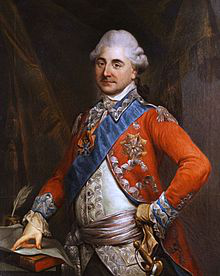

Grand Duke of Lithuania
17 January 1732 Wołczyn, Polish–Lithuanian Commonwealth
12 February 1798(1798-02-12) (66) Saint Petersburg, Russian Empire
NamesStanisław Antoni Poniatowski
last King of Poland and Grand Duke of Lithuania King of Poland Stanisław II AugustStanisław August Poniatowski, by Marcello Bacciarelli (1786)King of Poland Grand Duke of LithuaniaReign7 September 1764 – 25 November 1795 Coronation25 November 1764 St. John's Archcathedral, WarsawPredecessorAugustus IIISuccessormonarchy suppressed (Partitions of Poland)Born(1732-01-17 ) 17 January 1732 Wołczyn, Polish–Lithuanian CommonwealthDied12 February 1798(1798-02-12) (aged 66) Saint Petersburg, Russian EmpireBurialSt. John's Archcathedral, WarsawIssue Details... illegitimateHousePoniatowskiFatherStanisław PoniatowskiMotherKonstancja CzartoryskaReligionRoman CatholicismSignature Stanisław II August (born Stanisław Antoni Poniatowski, 17 January 1732 – 12 February 1798), known also by his regal Latin name Stanislaus II Augustus, was King of Poland and Grand Duke of Lithuania from 1764 to 1795, and the last monarch of the Polish–Lithuanian Commonwealth. Born into wealthy Polish aristocracy, Poniatowski arrived as a diplomat at the Russian imperial court in Saint Petersburg in 1755 at the age of 22 and became romantically involved with the future empress Catherine the Great. With her connivance, he was elected King of Poland by the Polish Diet in September 1764 following the death of Augustus III. Contrary to expectations, Poniatowski attempted to reform and strengthen the large but ailing Commonwealth. His efforts were met with external opposition from neighbouring Prussia, Russia and Austria, all committed to keeping the Commonwealth weak. From within he was opposed by conservative interests, which saw the reforms as a threat to their traditional liberties and privileges granted centuries earlier. The defining crisis of his early reign was the War of the Bar Confederation (1768–1772) that led to the First Partition of Poland (1772). The later part of his reign saw reforms wrought by the Diet (1788–1792) and the Constitution of 3 May 1791. These reforms were overthrown by the 1792 Targowica Confederation and by the Polish–Russian War of 1792, leading directly to the Second Partition of Poland (1793), the Kościuszko Uprising (1794) and the final and Third Partition of Poland (1795), marking the end of the Commonwealth. Stripped of all meaningful power, Poniatowski abdicated in November 1795 and spent the last years of his life as a captive in Saint Petersburg's Marble Palace. A controversial figure in Poland's history, he is criticized primarily for his failure to resolutely stand against and prevent the partitions, which led to the destruction of the Polish state. On the other hand, he is remembered as a great patron of the arts and sciences who laid the foundation for the Commission of National Education, the first institution of its kind in the world, and sponsored many architectural landmarks.

We use cookies
We use cookies and other tracking technologies to improve your browsing experience on our website, to show you personalized content and targeted ads, to analyze our website traffic, and to understand where our visitors are coming from. Privacy Policy.